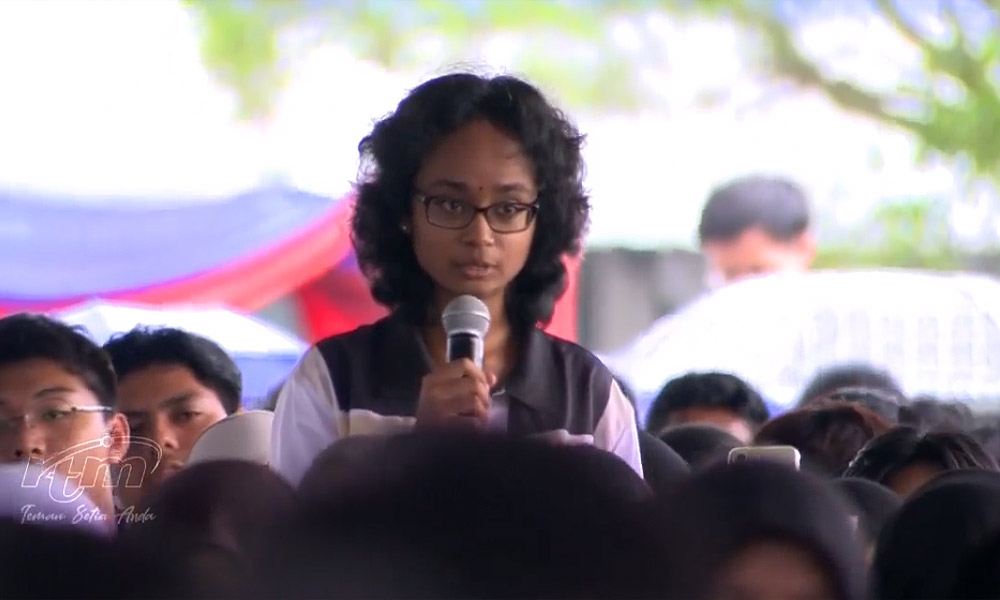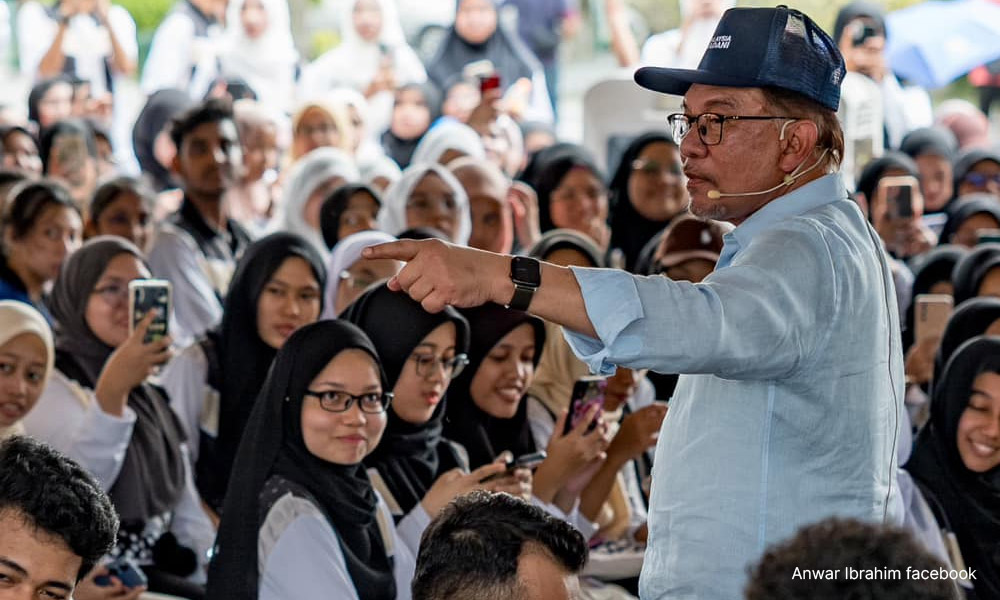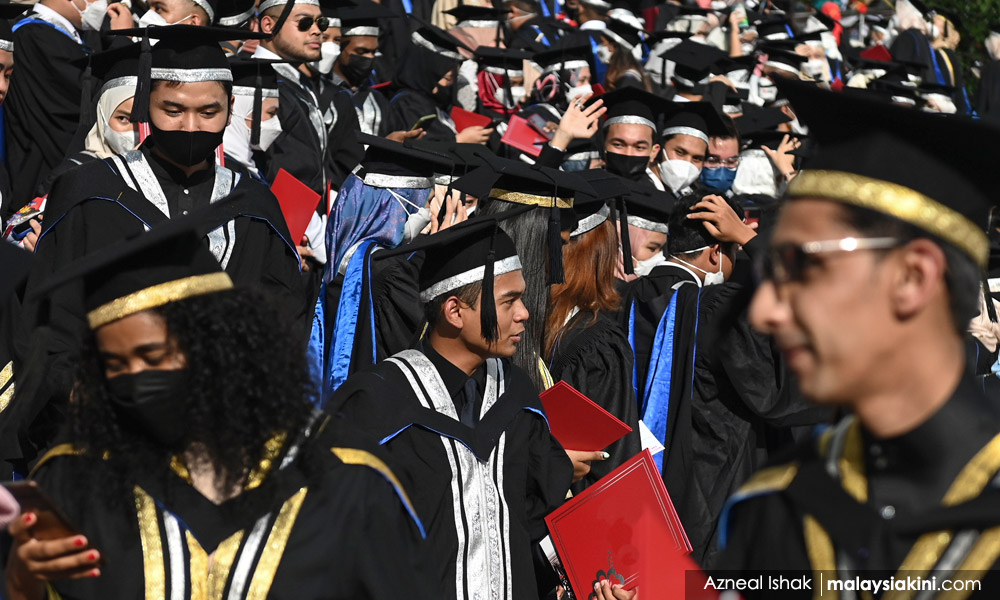"We need to create awareness that Malaysians - the Malays, Chinese, Indians, Ibans and Kadazans - should be seen as one community with equal rights and privileges."
– Anwar Ibrahim in 2019
As reported in the press four years ago, Anwar Ibrahim said he will accelerate the transition from race-based affirmative action economic plans to one that is needs-based when he becomes the prime minister.
The PKR president also said: "This is the position of Pakatan Harapan. This is the position of the prime minister Dr Mahathir Mohamad.”
Anwar’s recent encounter with an Indian student who was, in essence, demanding to be treated like an equal citizen of this country, is a prime example of why needs-based affirmative action is a lost cause for the non-Malays in this country.
The so-called social contract, bumiputera rights etc, are all red herrings. The key is when Anwar talked about “fairness” to this young girl, implying that by virtue of her ethnicity and her question, she was victimising the Malay community.
The “ketuanan” ideology is grounded in victimhood and blame, so it is no surprise that what Anwar did would merely reinforce this ideology.
How is it this young woman’s fault that there are Malays living in social and economic deprivation? Who is to blame? After decades of “ketuananism”, why are there still economically disadvantaged Malays? But forget about this for the time being.

Back in 2019, when Anwar was busy attempting to “accelerate” needs-based affirmative action, Setiawangsa MP Nik Nazmi Nik Ahmad wrote a piece titled “The need for needs-based affirmative action”.
This is where he countered the “shrill rhetoric” of the Malay Economic Action Council (MEAC), arguing that “…. needs-based approach is the best way to make positive reforms and renew the New Economic Policy (NEP) that they rightly argue Anwar should seek to do”.
He also wrote: “What Anwar is proposing will – properly executed and with the support of all stakeholders – uplift all of the B40s as well as reduce the gap between, as well as within, the different ethnic groups.
“Indeed, maintaining affirmative action on an indiscriminately racial basis will probably hurt the less well-off in the bumiputera community. After all, resources given to the bumiputera elite in the name of ‘maintaining the NEP’ will be denied to their M40 and B40 of the counterparts, who need them more.”
That is a righteous argument to make but you want to know which is the more politically effective argument to make. That is the one MEAC was making which was if "Anwar deviates from the expectation (of alleviating bumiputera poverty), the backlash will surely be swift and severe."

A telling point the president of the MEAC made was this one - "Race-blind affirmative action may be sufficient to improve the wellbeing of those at the bottom of the economic ladder but such an approach will be much less effective to narrow the economic gap at the top between ethnicities."
Needs-based affirmative action is the existential threat to “ketuananism” because as a Malay PSM activist put it to me recently, the mixing of poor people from all races and the solidarity borne out of mutual struggle would be devastating to the mainstream racial and religious politics of this country.
Blame the Malay political elites
Perhaps the best example I can think of is the way how the American political system was rocked because young people of different races started to mix.
And when did this happen? Well, during the American war in Vietnam, where because of the draft poor white farm boys from the bible belt started mixing with poor black and brown boys from the inner cities.
So profound was this experience that the current culture wars and race-baiting in the political mainstream are a reaction to the kind of movements borne from the mindsets of returning veterans from Vietnam.
Why are the Malays lagging behind? Don’t blame the non-Malays, blame the Malay political elites. This is also why right-wing hegemonists fear class narratives because they know that once people figure out their game, their positions become untenable.
Another thing that Anwar did very well in that exchange with this young student, was that he used the “success in spite of systemic discrimination” of the non-Malay community against her.
The fact that non-Malays have to struggle to get their children educated in the private education sphere is something that reinforces not only feelings of independence but also feelings of resentment towards the majority.
Keep in mind that all this is part of the “ketuanan” ideology, to constantly have these grievances bubbling under the surface of conviviality between the different ethnic groups.
Non-Malays should understand that needs-based affirmative action is a lost cause. So-called reformist or progressive mainstream Malay leaders will whisper sweet nothings into the ears of gullible non-Malays, but the system is predicated on ensuring racial and religious superiority.

Malay and non-Malay political operatives do not want to risk their grip on power, because it is one thing to talk about needs-based policies, and another to implement it. Political operatives know this.
They get away with this because they know that the Harapan base will be pragmatic and not demand needs-based policies because they do not want the ascension of whatever far-right coalition, which is somewhat hilarious seeing how things are playing out in Harapan now, that seeks to topple a supposedly multi-racial alliance.
Nobody wants to give up their special privileges, especially when those privileges sustain families and communities through the vagaries of a changing economic and geopolitical landscape.
Hence, if the government is giving you an education, housing and other subsidies by virtue of race, and another group comes along demanding a more egalitarian system to ensure that everyone gets a taste of the pie, you would of course reject such demands.
The fact is, non-Malay politicians, whether the old guard or the new, are never going to talk about taking away the special privileges of the Malays.
They are never going to talk about making our public taxpayer-funded public universities more inclusive, they are never going to talk about the subsidies given to only Malays should be taken away. That is the way the system has been built.
Of course, there are ways that the government can help non-Malays which does not involve dismantling the race-based affirmative action system but as the old maverick reminds us: "We still have to give them, but what we gave to them was very small (compared to what the Malays got). But we could not say it then, because then the Chinese would be angry.”
I admire this young Indian woman for speaking up even if it's for a lost cause. By now, readers should realise that I am a big proponent of lost causes. - Mkini
S THAYAPARAN is Commander (Rtd) of the Royal Malaysian Navy. Fīat jūstitia ruat cælum - “Let justice be done though the heavens fall.”
The views expressed here are those of the author/contributor and do not necessarily represent the views of MMKtT.




No comments:
Post a Comment
Note: Only a member of this blog may post a comment.